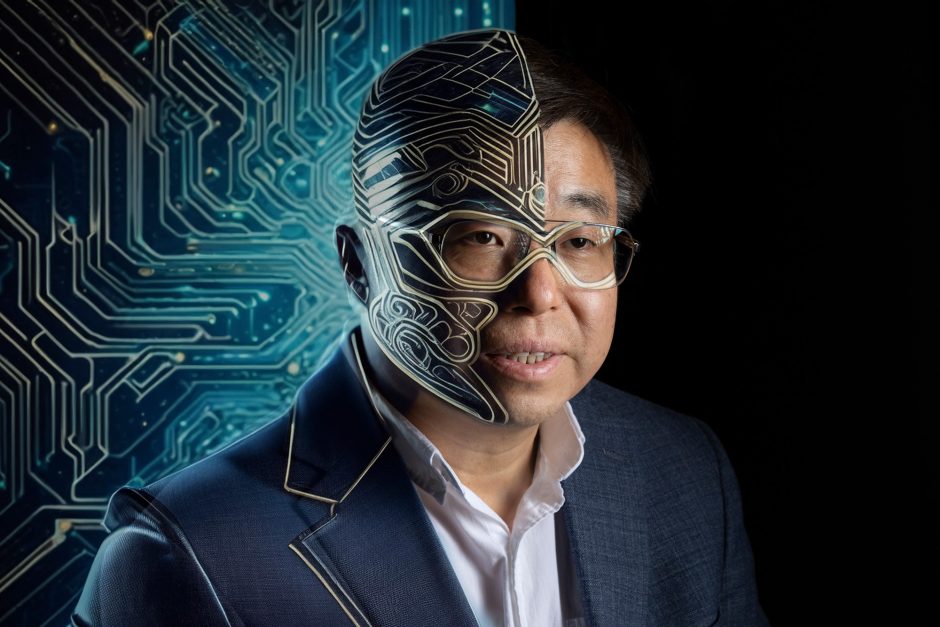
August 14, 2024
Contact: Janese Heavin, heavinj@missouri.edu
Photo illustration by Sam O'Keefe
Artificial intelligence (AI) can write, create videos and power self-driving cars. Someday, University of Missouri researcher Dong Xu predicts, it also will perform surgeries.
“Industries are already using AI-powered robotics,” said Dong Xu, who recently co-founded an academic journal on the technology. “In the coming decade, AI could also perform surgery with higher success rates than human doctors, do household chores and help manage your finances.”
Although AI has roots tracing back more than seven decades, it’s only been in the past couple of years that the broader public has felt its influence in daily life. And it’s advancing at a dizzying speed.
The rise of AI
The term “artificial intelligence” was coined in the 1950s when scientists set out to develop problem-solving systems.
“The idea was simple: to develop a machine that mimics human intelligence to process information, make predictions and take actions,” Xu said. “The turning point was in 2012 when people demonstrated deep learning on a large scale.”
Deep learning is a type of AI inspired by how our brain works. It involves training a computer to learn from many examples by large-scale neural networks. Neural networks are virtual “neurons” that process the information, with each neuron receiving input, performing a calculation and sending results to the next layer of neurons. These neurons work together to learn patterns and make sense of data. That’s why AI algorithms are good at recognizing images and processing speech and language.
Xu is a Curators’ Distinguished Professor of Electrical Engineering and Computer Science. In the Bond Life Sciences Center at Mizzou, he uses deep learning to sift through large amounts of data related to protein sequence, structure and function. As part of NextGen Precision Health, he’s developing novel methods for biomedical studies and applying them in disease studies and drug development. Xu is also working with researchers from the College of Agriculture, Food and Natural Resources to leverage AI to develop and commercialize more effective fungicides.
Cross-disciplinary collaboration among researchers — a longtime strategic priority for Mizzou — has been key to advancements in AI across campus.
“Mizzou has been ahead in terms of research around AI because of those types of partnerships,” Xu said. “AI research requires a lot of collaboration and expertise in order to make real progress and impact.”
In industry, AI is transforming finance as banks use it to detect suspicious transactions. AI powers the recommendations on your streaming services and in your Amazon cart. And Xu believes it will be key to advances in material development such as designing better batteries. Historically, this type of research and development has involved a lot of trial and error, requiring time and resources. AI speeds up that process by predicting and recommending the best materials and techniques — bringing innovative products to market faster and improving lives with solutions such as efficient energy storage.
AI offers up friendship too, with websites and apps that allow you to create AI companions and even digital copies of yourself. Xu believes these trends will soon become mainstream.
“In education, we’ll have personalized AI tutors that will be highly individualized to the learner,” he said. “Materials science, medicine, eldercare. AI is emerging in all of these areas, and we’ll see more of it in the next five to 10 years.”
Keeping up
If you’re having a hard time keeping up with advancements in AI, you’re not alone. Even Xu, who has focused on AI for more than a decade, has to make a concerted effort to stay on top of the trends.
“If you don’t keep up, the work will be outdated,” he said. “When I’m on my treadmill at home, I watch videos of people talking about AI. I’m always learning something new.”
That’s one reason Xu and collaborators co-founded the International Journal of Artificial Intelligence and Robotics Research, a quarterly publication that delves into the latest advancements and applications. Xu now serves as co-editor-in-chief of the journal, which features both scholarly works and commentary from prestigious universities and corporations such as Microsoft. Additionally, editors host supplemental webinars and events.
The journal will also tackle ethical issues around AI, such as concerns about manipulated content and cyberattacks.
“Already we’re seeing negative applications such as fake videos and images,” Xu said. “Any time there’s a new technology, there are risks, but AI poses a bigger risk because it’s really powerful.”
Ensuring the security and integrity of AI systems is critical to mitigating these risks, and Xu is optimistic that researchers will find solutions as the technology advances.
“The benefits outweigh the risks,” he said. “And the benefits of AI are tremendous.”
Editor's Note: Looking for experts on AI? Mizzou has the experts you need.



